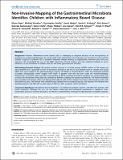Non-Invasive Mapping of the Gastrointestinal Microbiota Identifies Children with Inflammatory Bowel Disease
Author(s)
Papa, Eli; Docktor, Michael; Smillie, Christopher; Weber, Sarah; Preheim, Sarah Pacocha; Gevers, Dirk; Giannoukos, Georgia; Ciulla, Dawn; Tabbaa, Diana; Ingram, Jay; Schauer, David B.; Ward, Doyle V.; Korzenik, Joshua R.; Xavier, Ramnik J.; Bousvaros, Athos; Alm, Eric J.; ... Show more Show less
DownloadPapa-2012-Non-Invasive Mapping.pdf (716.1Kb)
PUBLISHER_CC
Publisher with Creative Commons License
Creative Commons Attribution
Terms of use
Metadata
Show full item recordAbstract
Background:
Pediatric inflammatory bowel disease (IBD) is challenging to diagnose because of the non-specificity of symptoms; an unequivocal diagnosis can only be made using colonoscopy, which clinicians are reluctant to recommend for children. Diagnosis of pediatric IBD is therefore frequently delayed, leading to inappropriate treatment plans and poor outcomes. We investigated the use of 16S rRNA sequencing of fecal samples and new analytical methods to assess differences in the microbiota of children with IBD and other gastrointestinal disorders.
Methodology/Principal Findings:
We applied synthetic learning in microbial ecology (SLiME) analysis to 16S sequencing data obtained from i) published surveys of microbiota diversity in IBD and ii) fecal samples from 91 children and young adults who were treated in the gastroenterology program of Children’s Hospital (Boston, USA). The developed method accurately distinguished control samples from those of patients with IBD; the area under the receiver-operating-characteristic curve (AUC) value was 0.83 (corresponding to 80.3% sensitivity and 69.7% specificity at a set threshold). The accuracy was maintained among data sets collected by different sampling and sequencing methods. The method identified taxa associated with disease states and distinguished patients with Crohn’s disease from those with ulcerative colitis with reasonable accuracy. The findings were validated using samples from an additional group of 68 patients; the validation test identified patients with IBD with an AUC value of 0.84 (e.g. 92% sensitivity, 58.5% specificity).
Conclusions/Significance:
Microbiome-based diagnostics can distinguish pediatric patients with IBD from patients with similar symptoms. Although this test can not replace endoscopy and histological examination as diagnostic tools, classification based on microbial diversity is an effective complementary technique for IBD detection in pediatric patients.
Date issued
2012-06Department
Harvard University--MIT Division of Health Sciences and Technology; Massachusetts Institute of Technology. Computational and Systems Biology Program; Massachusetts Institute of Technology. Department of Biological Engineering; Massachusetts Institute of Technology. Department of Civil and Environmental Engineering; Massachusetts Institute of Technology. Division of Comparative MedicineJournal
PLoS ONE
Publisher
Public Library of Science
Citation
Papa, Eliseo et al. “Non-Invasive Mapping of the Gastrointestinal Microbiota Identifies Children with Inflammatory Bowel Disease.” Ed. Jacques Ravel. PLoS ONE 7.6 (2012): e39242.
Version: Final published version
ISSN
1932-6203